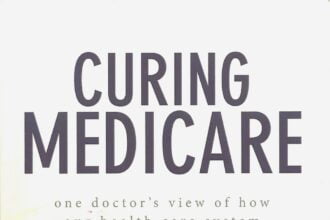The Bipartisan Options for the Future white paper [PDF] by Ron Wyden (Senate Democrat from Oregon) and Paul Ryan (Republican Congressman from Wisconsin) is billed as a bold move to reform Medicare.
The Bipartisan Options for the Future white paper [PDF] by Ron Wyden (Senate Democrat from Oregon) and Paul Ryan (Republican Congressman from Wisconsin) is billed as a bold move to reform Medicare. It is admirable that two prominent legislators from across the aisle have come together on the pivotal fiscal question of our era, but the plan itself is disappointing and even counterproductive.
It’s not just that I disagree with the details, which I do. The underlying principles themselves are also problematic.
To quickly summarize the plan, it is a modification of the earlier Ryan plan that would have switched Medicare over to a voucher system to be used to pay for private plans. The Wyden/Ryan version keeps the voucher element but also leaves fee for service Medicare intact.
Here are the main problems:
- The plan would keep everything the same for people 55 and older. According to the first principle, “Seniors should not be forced to reorganize their lives because of the government’s mistakes”
- The program’s provisions don’t kick in until 2022
- The plan relies on competition among health plans to bring down costs
- The plan places caps on spending and introduces rules on minimum benefit levels
- The plan includes a defined contribution option for private employers with under 100 employees
So what’s wrong with all those ideas? Quite a lot, actually.
The Medicare fiscal crisis is here today, it’s not something that can be put off till the next generation. The Medicare tax only pays about half of Medicare’s costs now. And people 55 and over are at least as culpable as those below that age for getting us into this mess. The line about seniors not having to reorganize their lives due to the government’s mistakes is nonsense. Maybe it’s not politically palatable to threaten existing beneficiaries or even anyone who’s remotely close to retirement, but the economics don’t work. As for the 2022 start for the program, that’s about three presidential cycles away. Are we really going to wait that long?
Ryan and Wyden seem to have a mystical belief that bringing private health plans into Medicare is going to control costs. Where is the evidence for this assertion? Private health plans have done a poor job of controlling costs in the private sector and Medicare Advantage plans cost the taxpayer more money than Medicare fee for service. Not to mention the fact that the white paper places all kinds of requirements on the health plans and “will also require the Centers for Medicare and Medicaid Services (CMS) to actively review marketing practices and benefit adequacy… CMS will… weed out junk plans and unqualified insurers.” Sounds nice, but that means we’ll be stuck with mandated benefits and excessive administrative hoops that will thwart innovation. There is a plan to hold down cost growth to just over GDP growth, and somehow (I’ll be curious to see the mechanism) overruns will be dealt with through “reduced support for the sectors most responsible for cost growth, including providers, drug companies, and means-tested premiums.”
The private employer provisions are a little weird and don’t belong in a Medicare plan. They encourage portability (which is fine) but go to great lengths to preserve tax deductibility for employers and employees.
Wyden and Ryan will get a lot of undeserved credit for pushing this plan. Today’s Wall Street Journal editorial refers to it as a “breakthrough.” It’s pretty clear the reason they support it is they think it will weaken Democrats’ argument that Republicans won’t do anything productive on Medicare and will lead to the defeat of President Obama.
Here’s what I would prefer:
- A recognition that Medicare reform has to start with current beneficiaries who are driving expenses today. There’s no excuse to wait 10 plus years, which will just make the problem worse and absolve a huge percentage of the population from responsibility. To me establishing this principle is more important than the details of the cost containment plan
- A focus on reforming the delivery system and payment methodologies, not just tinkering with the financing
- An end to tax deductibility of health insurance in the commercial market, which could be phased in over a five year period. That would reduce the incentive for overspending and help shrink the federal deficit. It would do a lot more than the Ryan/Wyden scheme to make the system more cost sensitive






